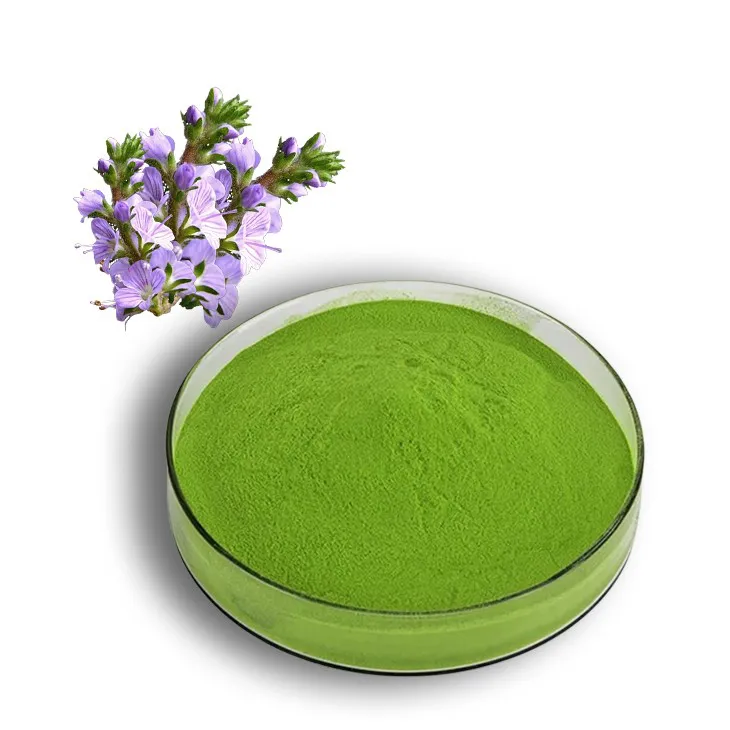- 0086-571-85302990
- sales@greenskybio.com
The Best Alfalfa Meal Product Supplier for Industrial Applications in the United States.
2024-12-17

Introduction
In the United States, the search for the best Alfalfa Meal product suppliers for industrial applications is a crucial aspect for many industries. Alfalfa Meal is a highly versatile and nutrient - rich product with a wide range of applications. It has become an essential component in various sectors, including agriculture, animal husbandry, and even some emerging industrial fields. This article will explore the characteristics of the top Alfalfa Meal product suppliers in the US, focusing on their quality control, innovation, and logistical capabilities.

High - Quality Alfalfa Sourcing
The top - notch suppliers in the US are known for their high - quality alfalfa meal. They ensure that the alfalfa is sourced from the best farms where it is grown under optimal conditions.
Optimal Growing Conditions
These farms usually have well - drained soil, which is crucial for alfalfa growth. Adequate sunlight exposure and proper irrigation systems are also in place. For example, in regions like California's Central Valley, the climate is ideal for alfalfa cultivation. The long sunny days and mild winters allow alfalfa to grow vigorously, resulting in high - quality yields. Suppliers often have long - term partnerships with these farms, which enables them to have a stable supply of high - quality alfalfa.
Selective Breeding
Some of the best suppliers are involved in or support selective breeding programs on these farms. By choosing the most suitable alfalfa varieties, they can enhance certain desirable traits. For instance, they may focus on breeding alfalfa with higher protein content or better resistance to pests and diseases. This not only benefits the quality of the alfalfa meal but also contributes to the overall sustainability of the alfalfa production.

Advanced Processing Techniques
These suppliers use advanced processing techniques to maintain the nutritional integrity of the alfalfa.
Harvesting at the Right Time
Timing is crucial in alfalfa harvesting. The best suppliers ensure that alfalfa is harvested at its peak maturity. If harvested too early, the alfalfa may not have reached its full nutritional potential. On the other hand, if harvested too late, the quality may decline. For example, they might use precision agriculture tools to monitor the growth of alfalfa closely and determine the exact time for harvesting. This attention to detail during harvesting helps to preserve the maximum amount of nutrients in the alfalfa.
Drying and Grinding Processes
After harvesting, proper drying is essential. Suppliers use modern drying equipment to reduce the moisture content of alfalfa quickly while minimizing nutrient loss. Once dried, the alfalfa is then ground into a meal. The grinding process is carefully controlled to achieve the desired particle size. A consistent particle size is important for various industrial applications, such as in animal feed where it can affect the digestibility of the feed.

Strict Quality Control
One of the key features of the best suppliers is their strict quality control. They test the alfalfa meal for various parameters such as protein content, fiber quality, and purity.
Protein Content Testing
Protein is a crucial component in alfalfa meal, especially for applications in animal feed. Suppliers use advanced laboratory techniques to accurately measure the protein content. For example, they may use the Kjeldahl method or near - infrared spectroscopy (NIRS). By ensuring the protein content meets the specified standards, they can guarantee the effectiveness of the alfalfa meal in providing essential amino acids for animals.
Fiber Quality Analysis
The quality of fiber in alfalfa meal also plays an important role. Suppliers analyze the fiber components, such as cellulose, hemicellulose, and lignin. Different industrial applications may require different fiber qualities. For example, in soil amendment, a certain ratio of fiber components can improve soil structure and water - holding capacity. Through fiber quality analysis, suppliers can ensure that their alfalfa meal is suitable for a variety of end - uses.
Purity Checks
Purity is another aspect that cannot be overlooked. Suppliers check for the presence of contaminants such as weeds, pesticides, and heavy metals. Weeds can reduce the quality of alfalfa meal, while pesticides and heavy metals can pose risks to the end - users, whether they are animals or in other industrial applications. Rigorous purity checks ensure that the alfalfa meal is safe and of high quality.
Innovation in Product Improvement
Moreover, the leading suppliers are often innovative in their approach. They are constantly researching and developing new ways to improve the product's quality and performance.
Enhancing Digestibility for Animal Nutrition
As mentioned earlier, they might be exploring methods to enhance the digestibility of the alfalfa meal for better animal nutrition. For example, they could be researching the use of enzymes or other additives to break down complex fiber structures in alfalfa meal. This can improve the absorption of nutrients by animals, leading to better growth and health. Some suppliers are also collaborating with research institutions to conduct in - vivo and in - vitro studies on alfalfa meal digestibility.
New Applications in Industrial Sectors
Suppliers are also looking for new applications of alfalfa meal in industrial sectors. For instance, in the bio - energy field, alfalfa meal could potentially be used as a feedstock for bio - gas production. By exploring these new applications, suppliers can expand the market for alfalfa meal and contribute to the development of more sustainable industrial processes.
Excellent Logistics and Delivery Systems
They also have excellent logistics and delivery systems in place. This ensures that the alfalfa meal reaches the industrial customers in a timely manner and in optimal condition, no matter the location within the US or even for international shipments.
Domestic Distribution
Within the US, suppliers have well - organized distribution networks. They use a combination of trucks, railways, and sometimes even waterways to transport alfalfa meal. For example, in regions where there are large - scale industrial customers, such as in the Midwest, suppliers can arrange for regular truck deliveries. In cases where longer distances need to be covered, railways can be a more cost - effective and efficient option. This multi - modal transportation approach ensures that alfalfa meal can be delivered quickly and at a reasonable cost to customers across the country.
International Shipping
For international shipments, suppliers are well - versed in the regulations and requirements of different countries. They ensure that the alfalfa meal is properly packaged and labeled. They also work with reliable shipping partners to guarantee that the product arrives at its destination in good condition. Temperature - controlled containers may be used during shipping to preserve the quality of alfalfa meal, especially when shipping to regions with different climates.
Conclusion
In conclusion, the best alfalfa meal product suppliers in the United States for industrial applications possess a combination of qualities. Their focus on high - quality alfalfa sourcing, advanced processing techniques, strict quality control, innovation, and excellent logistics makes them stand out in the market. These suppliers not only meet the current demands of various industries but also contribute to the future development of alfalfa meal applications through their continuous innovation and improvement efforts.
FAQ:
What are the main factors to consider when choosing an alfalfa meal product supplier for industrial applications?
The main factors include the quality of the alfalfa source, quality control measures, processing techniques, innovation in product improvement, and the efficiency of logistics and delivery systems. High - quality alfalfa should be sourced from good farms with optimal growing conditions. Stringent quality control ensures the product meets required standards for parameters like protein content and fiber quality. Advanced processing techniques maintain nutritional integrity. Innovation helps improve product quality and performance, and efficient logistics ensure timely and proper delivery.
How do the best alfalfa meal product suppliers in the US ensure product quality?
They ensure product quality in several ways. Firstly, they source alfalfa from the best farms where it is grown under ideal conditions. Then, they use advanced processing techniques to preserve the nutritional value. Also, they have strict quality control procedures. They test the alfalfa meal for different aspects such as protein content, fiber quality, and purity to make sure it meets the high standards needed for industrial applications.
What makes alfalfa meal suitable for various industrial applications?
Alfalfa meal is highly versatile and nutrient - rich. It contains components like proteins and fibers which are beneficial for different uses. For animal feed, it provides necessary nutrients. In soil amendment, it can improve soil structure and fertility. Its nutrient profile and properties make it suitable for a wide range of industrial applications.
How do the leading alfalfa meal suppliers contribute to innovation?
The leading suppliers contribute to innovation by constantly researching and developing new methods. For example, they may focus on improving the digestibility of alfalfa meal for better animal nutrition. They also look for ways to enhance other aspects of the product's quality and performance, which could lead to new and improved applications in the industrial sector.
Why is efficient logistics important for alfalfa meal suppliers in the US?
Efficient logistics is important because it ensures that the alfalfa meal reaches industrial customers in a timely manner and in optimal condition. Whether the customers are within the US or international, timely delivery without spoilage or quality degradation is crucial for the success of industrial applications that rely on alfalfa meal.
Related literature
- Alfalfa Meal in Industrial Applications: A Comprehensive Review"
- "Quality Standards of Alfalfa Meal for Industrial Use in the United States"
- "The Role of Alfalfa Meal Suppliers in the US Industrial Sector"
- ▶ Hesperidin
- ▶ Citrus Bioflavonoids
- ▶ Plant Extract
- ▶ lycopene
- ▶ Diosmin
- ▶ Grape seed extract
- ▶ Sea buckthorn Juice Powder
- ▶ Fruit Juice Powder
- ▶ Hops Extract
- ▶ Artichoke Extract
- ▶ Mushroom extract
- ▶ Astaxanthin
- ▶ Green Tea Extract
- ▶ Curcumin
- ▶ Horse Chestnut Extract
- ▶ Other Product
- ▶ Boswellia Serrata Extract
- ▶ Resveratrol
- ▶ Marigold Extract
- ▶ Grape Leaf Extract
- ▶ New Product
- ▶ Aminolevulinic acid
- ▶ Cranberry Extract
- ▶ Red Yeast Rice
- ▶ Red Wine Extract
-
Pomegranate Extract
2024-12-17
-
Dandelion Leaf Extract
2024-12-17
-
Senna Leaf Extract
2024-12-17
-
Bamboo Leaf extract
2024-12-17
-
Beetroot juice Powder
2024-12-17
-
Peppermint Oil
2024-12-17
-
White Peony Extract
2024-12-17
-
Phellodendron Extract
2024-12-17
-
Cassia Seed Extract
2024-12-17
-
Acai Berry Extract
2024-12-17





















